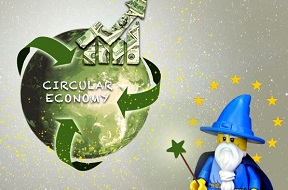New publication in the MAGIC project takes a critical look at circular economy
With the world’s attention focussed on COVID-19, issues that were in the forefront of public concern just a few months ago seem to have magically disappeared. When can we return to normal? Is the question that many are asking, but even if we could return to normal, should we?

Researchers Mario Giampietro, from Institute of Environmental Science and Technology of the Universitat Autònoma de Barcelona (ICTA-UAB) and Silvio Funtowicz (from SVT-University of Bergen UiB) argue that the pre-COVID situation was an unsustainable caricature of normality, in which climate and ecosystems disruptions, biodiversity loss, unattainable sustainability goals, growing socio-economic inequalities, and increasingly weak democratic institutions called for urgent systemic change. This is clear from a study recently published in the journal Environmental Science & Policy, based on years of accumulated trans-disciplinary knowledge and the insights of Post-Normal Science, and building on the experience and results of the EU Horizon 2020 project MAGIC.
“As the Italian politician and philosopher Antonio Gramsci argued almost a century ago, when the old is dying and the new cannot yet emerge, the in-between becomes increasingly pathological”, they say. The escape from reality into the mythical world of fantasy is represented by Giampietro and Funtowicz using the example of the circular economy as a policy goal in the institutional and public debate over sustainability.
Recognising the importance of recycling, they argue that although rhetorical powerful, the circular economy concept has almost no empirical content; they illustrate this lack of scientific underpinning referring to a wide variety of fields of knowledge, including biology, ecology, anthropology, non-equilibrium thermodynamics, energetics and bioeconomics.
The grand plans to return to normality with a green recovery currently promoted will imply to do more of the same but faster. “They will require relying further on the economy of promises of techno-scientific silver bullets. This choice carries the risk of ignoring the real hazards of betraying the historical popular struggles to increase civil freedoms and socio-economic fairness” they state.
Giampietro and Funtowicz conclude claiming that there is an opportunity to face the tragedy of change by engaging immediately in socially robust and rigorous assessment processes of policy-relevant knowledge claims, focussing on quality as fitness for purpose. These will include an evaluation not only of the ‘science’ but also of the political feasibility, viability, and desirability of proposed policies to move to a post-growth caring economy.
Scientific article
Mario Giampietro & Silvio Funtowicz. (2020). From elite folk science to the policy legend of the circular economy. Environmental Science & Policy. https://doi.org/10.1016/j.envsci.2020.04.012